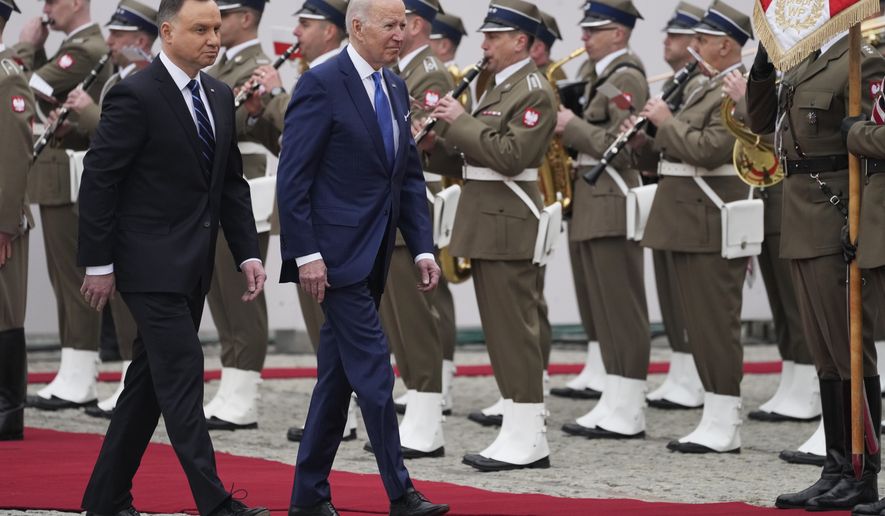President Biden on Saturday sought to reassure Polish President Andrzej Duda that NATO would respond in lockstep if Russia expands its war beyond Ukraine and launches an attack on Poland.
Mr. Biden underscored the U.S. commitment to Article 5 of the NATO charter, which spells out that an attack on one member of the alliance must be met with a collective response from all the members.
The comments come amid fears that Russia could expand its aggression into Poland, which is a member of the 30-country NATO alliance.
White House national security adviser Jake Sullivan on Friday offered its strongest assessment yet that Russia could invade other Eastern Europe countries, including NATO allies Poland and Romania.
In a meeting with Mr. Duda in Warsaw, Mr. Biden sought to reassure his counterpart that NATO would respond if Poland becomes Russia’s next target.
“We take Article 5 as a sacred commitment, not a throwaway — a sacred commitment that relates to every member of NATO,” Mr. Biden said at a meeting with Polish President Andrjez Duda in Warsaw.
Mr. Biden also stressed that NATO is more united than ever amid Russia’s ongoing invasion of Ukraine. He said that unity is a key tool against Russian President Vladimir Putin.
“The single most important criteria in this time of a changing world is that NATO stay absolutely completely united, that there be no separation; that whatever we do, we do in unison,” Mr. Biden said.
“I’m confident that Vladimir Putin was counting on being able to divide NATO and being able to separate the eastern flank from the west, be able to separate nations based on past history, but he hasn’t been able to do it,” Mr. Biden said.
Mr. Duda said the Polish people are feeling a “great sense of threat” right now. He talked about strengthening Poland’s military relationship with the U.S. to boost its defense.
“We are a serious partner, we are a credible ally,” he said. “We do everything we can to live up to the task of defending our country ourselves,” he said.
Mr. Duda talked about how Russia has attacked Poland in the past, saying that his country has begun allocating 3% of its gross domestic product to defense spending. That number is expected to increase over the coming years, he said.
The meeting between Mr. Biden and Mr. Duda concluded the U.S. president’s multi-day swing through Europe that began with an emergency NATO summit in Belgium in response to the Ukraine war.
It comes as officials on both sides of the Atlantic warning that a Russian attack on Poland is possible in the near future.
“We do believe that Russian aggression in Ukraine shows a willingness to disregard international borders and to disregard the basic rules of the road of the international community that have been built and sustained over the course of seven decades,” Mr. Sullivan, the White House national security adviser told reporters
Previously, the White House had dismissed questions about whether Mr. Putin would stop with Ukraine as hypotheticals.
But Mr. Sullivan signaled that the U.S. has been preparing for a potential Russian invasion of its Baltic neighbors, including Poland and Romania.
“The president has been very explicit that part of the reason he’s sent forces forward to the Baltic States, to Poland and Romania and he’s supported the setup of these four battle groups southern countries of NATO’s eastern flank is because it is important, in this moment, to send a clear message to Russia that the United States and NATO will defend every inch of NATO territory,” Mr. Sullivan said.
In a virtual address to NATO members on Thursday, Ukraine President Volodymyr Zelenskyy warned that Russia could attack other countries, including members of the 30-member NATO alliance.
“I am sure you already understand that Russia does not intend to stop in Ukraine. Does not intend and will not. It wants to go further,” Mr. Zelenskyy said.
“Against the eastern members of NATO. The Baltic states, Poland — that’s for sure. Will NATO then stop thinking about it, worrying about how Russia will react? Who can be sure of that? And do you have confidence that Article 5 can work?” he said.
Correction: An earlier version of this story incorrectly reported the total number of NATO member countries. There are 30.
• Jeff Mordock can be reached at jmordock@washingtontimes.com.




Please read our comment policy before commenting.